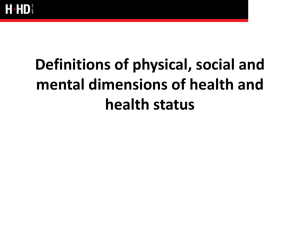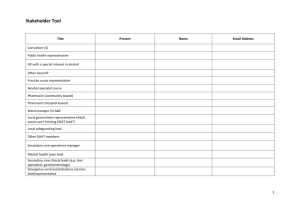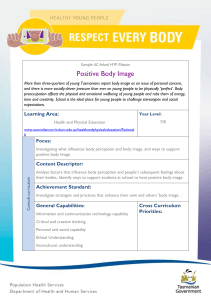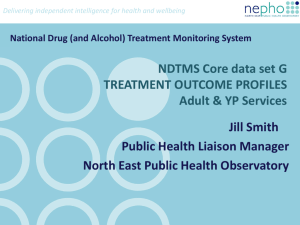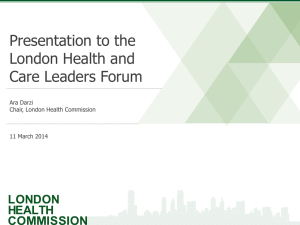1
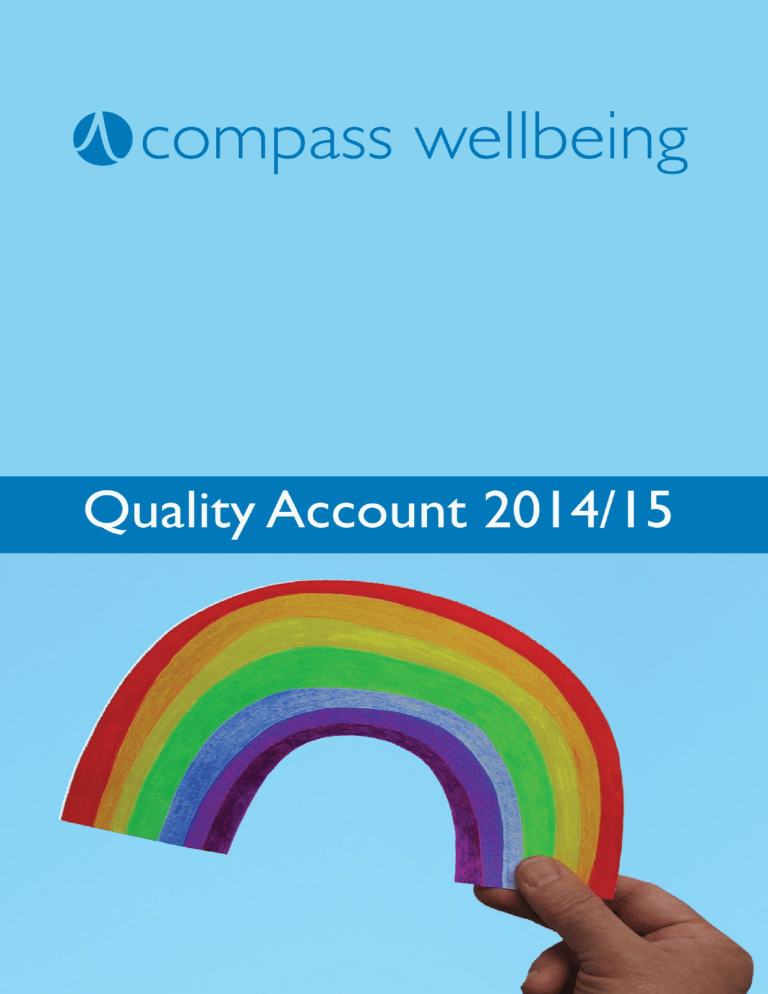
1
Contents
Part 1
Statement and Introduction from the Chief Executive ................................... 3
Part 2
Looking Forward - Improving Quality in 2015/16 ........................................... 6
Part 3
Part 4
Other Achievements 2014/15 ...................................................................... 17
Part 5
2
Part 1
Statement and Introduction from the Chief Executive
I am very pleased to introduce the first Quality Account for Compass
Wellbeing. Compass Wellbeing CIC was established in April 2013 when we moved out of Barts Health NHS Trust. We were formerly known as the Tower Hamlets Primary Care Psychology and Counselling Service and have a
30 year history of providing high quality psychological therapies services to general practice and the local community. Now as a Social Enterprise, our social mission is at the heart of what we do:
To improve wellbeing in the communities we serve, creating change to improve outcomes for clients, families, organisations and communities; building on their strengths and resilience, so that people can live life to the full.
We work in partnership with our users, the local community and referrers and are committed to providing high quality services that are accessible and free to local people.
We are always focussed on delivering our strategic objectives:
Providing excellent proactive services at individual, family and community levels
Continuously improving the quality and value of our work
Recruiting, retaining and developing a skilled and motivated workforce
Developing effective partnerships with local and national organisations for the benefit of our communities
Ensuring our service is experienced as respectful, compassionate and relevant
Making the best use of resources
Our approach to Quality
We position quality right at the centre of our organisation. Quality is the spinal column providing the framework for everything we do; underpinning decision making across the organisation. We drive quality forward by being open to feedback, analysing and understanding any problems, planning, delivering change and assessing impact.
Our Quality Account will firstly outline the services we provide, highlight our priorities and commitment for continuous improvement for 2015/16, review our key achievements from
2014/15 and finish with feedback expressed from our key stakeholders.
3
I confirm to the best of my knowledge and on behalf of the Board and all the Executive
Directors that the information provided in this document is accurate.
We would like to thank our staff, clients and stakeholders for their contribution to this quality account.
Lucy Marks
Chief Executive Officer
30 years history of providing psychology and counselling
We engage directly with the community to address the inverse care law
Social
Mission
We work in partnership with local people, the community and referrers
We are flexible and responsive and adapt to the changing environment
We are continuously improving quality and productivity to increase value
4
Services Provided
Our staff
Our staff provide services through the following teams who work collaboratively in order to deliver our social mission.
Psychology and Counselling
Improving Access to Psychological Therapies Team (IAPT)
This service is part of the national drive to increase access to evidence based psychological therapy services for common mental health problems. Our staff provide Cognitive
Behavioural Therapy (CBT) interventions for mild to moderate mental health problems for adults aged 18 upward.
Practice based Psychology and Counselling Team
Primary Care Psychologists and Counsellors work in General Practice providing consultation to GP’s regarding complex clients as well as assessment and treatment services for adults aged 18 upward who may need more specialist help.
Children’s Centre Adult Psychology Team
This service provides psychological therapy for pregnant women and their partners and for parents of children under 5 years. The service targets parents who are experiencing anxiety and depression through a combination of individual and group work.
Disability and Health Counselling Team
The Disability and Health Counselling team provide specialist counselling through talking and signing therapies for individuals, carers and families with acquired or congenital disabilities, sensory impairments or long term conditions.
Asian Counselling Service
We have recently taken over a contract to provide counselling in Bengali/Sylheti, for the
Bangladeshi community in Tower Hamlets.
School Health Service
We are delighted to have recently taken over the School Health Service for Tower Hamlets.
We will be working with the staff to analyse quality and develop a plan for improvement in the coming months.
5
Part 2
Looking Forward - Improving Quality in 2015/16
What will we do?
Areas agreed with our commissioners
Compass Wellbeing will work towards the new national waiting times targets for IAPT services “… by March 2016, 75% of people referred to the IAPT programme begin treatment within 6 weeks of referral, and 95% begin treatment within 18 weeks of referral.” Compass Wellbeing commits to ensuring that waiting times for treatment in
IAPT services and at step 4 are in line with the targets above by 31 March 2016
We will provide talking therapies to patients with stable psychosis or bipolar disorder, in the context of the CCG’s broader commissioning intentions to develop the next phase of
Enhanced Primary Care Mental Health Services
We will provide talking therapies to patients with chronic depression, in the context of the CCG’s broader commissioning intentions to develop the next phase of Enhanced
Primary Care Mental Health Services
We will provide talking therapies to patients with eating disorders, in the context of the
CCG’s broader commissioning intentions to develop the next phase of Enhanced Prima ry
Care Mental Health Services
We will communicate with primary care at network level, sharing access data with them
We will improve access for older adults and BME communities
Our other priority areas include
1.
We will roll out case management across the whole team
2.
We will increase group supervision time
3.
We will provide our staff with specialist domestic violence training
4.
We will complete a research project looking at why clients drop out of treatment
5.
We will re-design our service in response to the staff listening exercise
6.
We recognise that we need to improve our data quality for submissions to NHS England
6
Part 3
Looking Back 2014/15
Priority areas we have been working on
Upon review 2013/14, our first year of operation, we worked on developing our system processes and infrastructure to enable staff to be more effective and creating an environment to help them flourish.
In our second year of operation, 2014/15, we set priorities related to patient safety , clinical effectiveness and patient experience . Our focus has been not just on what we do but what the experience is like for staff, clients and stakeholders and what they can tell us about what we need to change going forward.
Patient Safety
Last year we focussed on Safeguarding and Risk Management to ensure our patients and our staff felt competent and well supported to deliver safe care to our clients.
We recognised that:
Staff need to be trained to the required level in delivering safe care
The organisation needs to have clear structures and processes for managing risk
To achieve our goals we did the following:
1.
Trained two Clinical Leads for Safeguarding to advanced practitioner level. The leads have completed the NSPCC Designated Safeguarding Officer Training and London
Borough of Tower Hamlets Signs of Safety training and act as expert reference points for all Safeguarding queries and training.
2.
Updated all staff training in Safeguarding, to Level 3, through the provision of two whole team learning days facilitated by the Local Authority all staff attended those in clinical as well as non-clinical roles. Safeguarding training is part of our induction for new staff and the Safeguarding Leads have set a standard of repeating safeguarding training every three years or sooner if legislation changes require it.
3.
Risk assessment training has been reviewed and embedded through the induction process and through the Line Management system. Line Managers are a core part of new staff induction, and they deliver Risk Training as part of their line management to
7
new staff ensuring that new employees are competent in identifying and managing clinical risk.
4.
As part of our commitment to improving wellbeing, we deliver wellbeing workshops throughout the borough and run information sessions and stalls at community events .
While these do not constitute therapy sessions, we recognise that unforeseen incidents can occur at such events and in the last year we developed a set of guidelines and held training sessions for staff involved in community engagement work.
5.
Ensured a senior member of staff was formally trained in Root Cause Analysis investigation. Although we have not had an incident in our service history, we recognise that as part of our risk processes in the organisation we need to establish the methodology we would use for such investigations. Root Cause Analysis is a tried and trusted methodology used throughout the NHS and will be part of our approach to the investigation of incidents going forward.
6.
Reviewed our Duty Management system to ensure it is fit for purpose with Duty
Managers clear about their roles and responsibilities through the development of clear guidelines and training for new and existing Duty Managers. Duty Managers respond to all queries regarding clinical risk occurring in triage or at screening, possible safeguarding issues and concerns raised by patients or referrers. Duty management enables those clients where there are risk issues to be dealt with swiftly and in partnership with other agencies to avoid preventable harm. From feedback from the staff we increased capacity in Duty Management through the addition of new Duty Managers. The training pack was updated and support systems put in place for all new Duty Managers.
8
60%
55%
50%
45%
40%
Clinical Effectiveness
Our priority for clinical effectiveness in 2014/15 focused on improving clinical outcomes for patients and collaborating in a clinical research trial to develop emerging evidence for best practice in the treatment of depression.
In the past year our clinical outcomes for clients receiving treatment in our service have improved. Compass Wellbeing recovery rates are consistently above the London average of
41%.
2014-15
2013-14
35%
30%
Apr May Jun Jul Aug Sep Oct Nov Dec Jan Feb Mar
Fig. 1: Compass Wellbeing Recovery Rates
Recovery Average for 2014/15 = 44.8%
Recovery Average for 2013/14 = 43.3%
Recovery Average across London = 41%
To achieve our goals we did the following :
1.
Piloted a case management approach
The case management approach is designed to help the clinician and client to identify blocks in therapy through continually attending to patient goals and making sure that clinical interventions are based on best practice, are jointly decided between the client and the patient and are rooted in a shared formulation of the client’s difficulties.
9
Feedback from the pilot has been positive with the process being seen as enabling for clinicians and of value for the clients. It has added an extra dimension to the work of clinical teams by limiting therapeutic drift.
2.
Improved Rapid screening and allocation of new referrals
Positive clinical outcomes depend on clients being able to access the right service at the right time. The service operates an initial screening of all new referrals to see if we are the right service for the client. The client is then contacted and a telephone or face to face triage is arranged. A recommendation is made following an internal allocation process which is then discussed with the client.
In the past year we reviewed and changed our screening system to ensure unnecess ary delays were kept to a minimum. Delays in screening mean delay in a client getting the help they need, whether this is with us or another service. New screening guidelines, standards and systems have been drawn up and implemented. Screening clusters operate 24 hour turnaround for all routine referrals to have been screened and put on the triage pathway. Complex referrals now have a 4 day turnaround. The changes ensure referrers and clients are contacted quickly which means that clients do not experience unnecessary delays post referral.
Internal review noted that allocation could be delayed by a week under the current system. Feedback from staff via our listening exercise indicated we were not maximizing the contribution staff could make to the allocation process by using a system that focused allocation decisions on one professional group. Feedback from clients told us that swift allocation post triage was important to them.
As a result of this we reviewed our allocation procedure to ensure that routine allocation decisions could be made within 48 hours of the triage and treatment options discussed and agreed with clients.
Guidelines and training have been given to new allocators. The result of this improvement has been to have patients on a treatment pathway quickly with treatment plans agreed with clients.
3.
Participated in a research trial for the effectiveness of Dynamic Interpersonal Therapy
This research trial was carried out in partnership with the Tavistock and Portman NHS
Trust. Dynamic Interpersonal Therapy (DIT) is a short-term psychoanalytic treatment for depression. Our service was the initial pilot site for the development of this new short term psychoanalytic therapy package, from which the first cohort of clinicians were trained. A number of our staff took part in a Random Controlled Trial (RCT) which has formed part of the evidence base for NICE to approve DIT as a treatment for depression.
Our involvement with the trial contributes to the development of effective treatments for depression and the development of best practice. The findings from this research will be analysed in in further depth in our next Quality Account 2015/16.
10
Patient Experience
As a new social enterprise, we want to design our service in a way that takes account of the views of our clients, our staff and our stakeholders. Our priority for 2014-2015 was to listen to what our staff, patients and stakeholders have to say about us in order to plan changes.
To achieve our goals we did the following:
1.
We asked our clients about their experience of the treatment in our service using three methods a) Post therapy Patient Experience Questionnaire
As part of our monitoring we ask patients about their experience of treatment in our service after the last session using a patient experience questionnaire. The results shown in the table below indicate that clients have a very positive experience of our service.
Question
At all times
Most of the time
Sometimes Rarely Never
Did staff listen to you and treat your concerns seriously?
Do you feel that the service has helped you to better understand and address your difficulties?
94%
70.9%
5.2%
26.9%
0.8%
2.2%
0%
0%
0%
0%
Did you feel involved in making choices about your treatment and care?
On reflection, did you get the help that mattered to you?
Did you have confidence in your therapist and his/her skills and techniques?
82.8%
79.8%
96.3%
13.4%
18.7%
3.0%
3.8%
1.5%
0.7%
0%
0%
0%
0%
0%
0%
Fig.2: Patient Experience Questionnaire b) Triage Experience Questionnaire
We asked clients routinely about their experience of the triage process in our service. Our triage contact with clients is usually made by telephone. The purpose of this triage is to gather information from the client about what their problem is and what they would hope to work on in their contact with us. Following triage we discuss treatment options with the client and come to an agreement with them of the best way forward. The table below indicates clients’ satisfaction with the triage.
11
2.9%
26.2%
70.9%
Completely Satisfied
Mostly Satisfied
Neither Satisfied nor Dis-satisfied
Fig.3: Patient satisfaction with Triage 2014-2015
While we are pleased that 98.9% are satisfied with the triage process, further analysis of the free text option indicated there were a number of areas of concern we need to address in the next year:
14% were concerned about the length of time they would wait for treatment post triage. Time waiting for treatment is an on-going theme for clients in their feedback and is an area we will address in the coming year
6% reflected that although they were satisfied with the telephone assessment and the staff who spoke to them, they found it difficult to understand some of the questions and would have preferred to have seen someone face to face c) Telephone survey post discharge
A sample of 49 clients talked to us about their experience of the service. 100% said they would recommend us to their families and friends. When asked ‘How would you rate the overall service provided by Compass Wellbeing?’ 100% of the respondents gave a positive response. 73% answered that the service was excellent with 27% saying it was good.
12
27%
73%
Excellent
Good
Fair
Poor
Very Poor
Fig.4: How would you rate the overall service provided by Compass Wellbeing?
We asked patients if they had any suggestions that could have improved their experience;
14% suggested that patients have more sessions, with 7% proposing having an extended time frame for appointments for patients who work. 3% thought that it would beneficial if the information about Compass Wellbeing was in the Bengali media so that people who cannot speak or read English were aware of the services that were available to them. The other 3% thought that a follow up or refresher course for patients may be beneficial so that they do not start to relapse.
While we are proud of the positive feedback we have received we are aware there are areas for improvement. An analysis of the free text option in the questionnaire indicates one main theme again to do with waiting times for treatment.
10% of clients told us that although they were extremely positive about the service they received from us they felt that the wait from assessment to treatment was too long. The service operates within the 18 week treatment window agreed with commissioners but this feels too long for our clients. We are mindful of the risk of deterioration while clients await therapy and do offer access to online support as well as support from the referrer during the waiting time however we are aware that this is a serious issue for clients and is something we will address as a priority in 2015-2016.
2.
Staff listening exercise
We recognise that our greatest asset is our staff. Safe, compassionate, effective care for patients relies on staff being engaged, feeling respected and supported, understanding their
13
role and having the right kind of supervision and training to enable them to fulfil their responsibilities.
As part of our priority for 2014-2015 we engaged with staff in a listening exercise which took the form of a staff survey, a set of meetings with small groups of staff with an external facilitator and the setting up a staff forum with representatives from each part of the organisation which has a mandate to raise service issues and suggest possible solutions.
The three pieces of work identified three key areas for improvement: i.
Introduction of extended hours
Staff felt that the patient experience could be improved by extending the service opening hours.
In response to this we developed a staged extended hour’s programme.
Extended hours have been underway for all courses since the summer of 2014 ii.
Screening/allocations could be done in a more effective way
The old system relied too much on one professional grouping to make allocation decisions.
In response to this we reviewed and changed the allocation process so that staff at every level are involved in allocations iii.
Improving team working and improving communication
With the transfer to the new organisational form and the structural changes within the team, staff wanted to increase communication about the overall service and new developments.
In response to this we created more regular, whole team meetings with Directors to ensure there is on-going conversation between staff and Directors
A monthly set of supervision groups will be set up to share good practice and expertise across the service
The external facilitator recommended that we carry out a redesign of the service so that staff were clearer about where decisions were made and where the authority lay for taking things forward
In 2015-2016 we will be doing a redesign and we will assess the impact of the changes
3.
GP Survey
We carried out a survey with Tower Hamlets GP’s to find out their views on our practice psychology and counselling team.
The purpose of the survey was to establish:
How useful they find the different aspects of the service
What they valued most
14
Other ways they thought the Psychologist/Counsellor could help manage mental health in Primary Care
The survey results indicate that Tower Hamlets GP’s rate the quality of the service very highly and that our model is a good fit for them.
Our partnership with general practice extends beyond being a referral source for the practice. We also seek to be a psychological resource for practices in the management of complex clients whose problems straddle physical and mental health.
The graph below indicates GP’s view of the quality of the services provided by Compass
Wellbeing.
GP’s rated the service on a number of questions on a 5 point likert scale with 5 being the highest score and 1 being the lowest. 97% rated the quality of the service at 3 or above.
3%
5%
54% 38%
Poor
Fair
Good
Excellent
Fig.5: GP rating of Quality of service
There are particular areas that GP’s have identified, which could improve the GP and patient experience. These areas are not necessarily the sole realm of Compass Wellbeing but they give indications of areas we can focus on in 2015-2016 for improvement. The key areas are similar to the areas highlighted by patients, namely:
15
Waiting times
Waiting time for treatment is an issue for clients and referrers alike. In 2014-2015 we worked hard to ensure clients were seen within the 18 week window. Waiting times in mental health is a national priority for 2015-2016 and we have been working with our team and our commissioners on how we will address this.
Continuity of service when employees change
As part of our response to this, our screening clusters ensure that all practices have more than one named clinician for each practice. In the event of staff absence or change the named clinician will continue to liaise with the practice and ensure disruption to clients is minimised.
Patients who fall between primary and secondary care
As part of addressing this concern we have been working with commissioners and our colleagues in secondary care by developing enhanced primary care mental health services.
This will be part of our priorities for 2015-2016.
Data Quality
Compass Wellbeing is committed to improving data quality in the service.
We are taking action to improve data quality following a benchmarking exercise against national average for data quality.
Over the last 2 years with the introduction of our new patient information system we are able to ensure information is accurately entered onto our systems. Our data is monitored on a monthly basis and uploaded to Department of Health information sites for NHS England. Currently our data quality stands at:
National Average
Compass Wellbeing
74%
70%
Fig.6: Data validation
In the next year we will work with staff to ensure our data quality improves.
Incident Reporting and Complaints
In 2014/2015 there were no incidents reported and no formal complaints were made against the service.
16
Part 4
Other Achievements 2014/15
Social Enterprise of the Year
In our second year of operation, Compass Wellbeing was a finalist in the social enterprise of the year award. This was a great honour and has inspired us to continue to learn from the excellent practice in the social enterprise sector in developing social value.
Family Wellbeing day
In September 2014 we ran a family wellbeing day in a local Ideas Store. It was a huge success with over 700 people attending and taking part in the various activities and workshops on offer.
The response was overwhelming and people generously gave their time to tell us about what mattered to them about their own and their family’s wellbeing, how they experienced our service and what they thought we could do to help people’s mental wellbeing (see previous sections on service user feedback).
17
Fig.7: Image from Family Wellbeing Day
400
350
300
250
Entering into treatment: 2014/15 against 2013/14
In 2014-2015 a total of 4686 people entered treatment in our service against our target of
4,680.
The graph below shows the number of patients entering into treatment for this financial year in comparison to last year’s data. In total, the number of patients entering treatment has been significantly higher than last year, an increase of 16%.
500
450
200
Apr May Jun Jul Aug Sep
2014-15
Oct Nov Dec Jan Feb Mar
2013-14
Fig.8: Number of patients entering treatment
Reaching Out
As part of our mission to improve access to communities who do not always access mental health service, we have engaged in a marketing campaign to open up conversations about emotional health in hard to reach communities. Throughout the year we have held information stalls at all Idea Stores, local events and in One Stop Shop to promote Compass
Wellbeing.
Most significantly we have delivered a series of emotional health and wellbeing workshops to raise awareness and to recognise symptoms of stress, anxiety and depression. The workshops also aim to de-stigmatise mental health services as well as address barriers to access. As a result of these endeavours, over 350 people from hard to reach groups
18
500
450
400
350
300
250
200
150
100
50
0 accessed our services, those who would not have otherwise been in contact with our services.
Postcard campaign
A postcard was sent to every household in Tower Hamlets (see below) letting people know about our service and how they could self-refer. As a consequence, self-referrals to our service have increased by 148% in comparison to last year. Service users have fed back very positively about this improvement.
Self Referrals
Q1 Q2
2013/14
Q3 Q4 Q1 Q2
2014/15
Q3 Q4
Fig.9: Self-referrals
19
20
Fig.10: Postcard image front and back cover
Part 5
What People Say About Us?
What clients say
"The service was
excellent
- the therapist was very considerate and listened well to my concerns. She made time to address issues I raised. Her care was helpful and she was patient with me, helping me to make sense of the difficulties I had. She has equipped me well to deal with the issue of self-esteem and provided me with techniques that help immensely. I'm very
grateful
for her help.”
"At first I was apprehensive about CBT but my therapist put me at ease and was very
understanding
of my needs.”
“From the very first telephone interview to the first session and onwards it has been an absolutely
brilliant
journey.”
“It's been a life changing experience bringing a more positive outlook to my life. Thanks to
Helen I feel more
confident
in managing anxiety.”
“My experience with the service has been largely positive and I feel that I have developed a set of skills that will allow me to live my life in a
healthier
and happier way. Whilst therapy isn't always the easiest thing to commit to, my therapist remained encouraging and
supportive
throughout, allowing me to reach the conclusions that I needed to, in order to progress and deal with my problems.”
“I was in a bad state when I first saw Nazma from Psychology service, I thought I was going mad, after the sessions, my confidence increased, and talking in my language in Bengali has been the best part and the most
helpful
. I am in a much better place and
happier
within myself. And would like to thank the therapist for the help.”
“Raising Happy babies taught me that others are
feeling
the same and to be easier on myself.”
21
What GPs say
“Fantastic
2-way communication, keeps me updated as appropriate re patients - especially if I have flagged up concerns regarding increased vulnerability.”
“Important conversation using the
expertise
and knowledge of both parties to come up with the optimal options to help patient.”
“Opportunity for good communication when discussing patient's needs and most appropriate route for care. We already assume that if the patient is being seen by the psychologist or counsellor that they are getting a
quality
assessment and therapy.”
“In general I am very
impressed
with the service and its outcomes.”
“I think that the service is very good and I realise we are
lucky
compared to some other boroughs.”
“You’ve done some
exceptional
work on the patients you’ve seen. Patient’s feedback has been very encouraging.”
“Excellent
communication and feedback. Our Psychologist is an integral part of the practice.”
22
Statement from Tower Hamlets CCG
NHS Tower Hamlets Clinical Commissioning Group (CCG) welcomes the opportunity to review the Compass Wellbeing Quality Account and to provide this statement.
We have worked closely with Compass Wellbeing to review quality, performance and improve services for the population of Tower Hamlets. In 2014-15 the CCG worked with
Compass Wellbeing on designing primary care mental health services and on a pilot
Research Innovation Fund project to develop pathways for referral to on-line support provided by Big White Wall.
We confirm that we have reviewed the information contained within this Quality Account and compared the data provided against available sources.
We agree with the priorities identified by Compass Wellbeing for 2015/16 within the Quality
Account; however, the quality account could have been clearer regarding how views and feedback from patients and staff were used to inform these priorities.
There are some areas where we believe further or more detailed information is required to meet the guidance. These areas are:
More detail as to what Compass Wellbeing has been doing as a direct result of patient feedback both formal and informal
More detail on how Compass Wellbeing performance compared to national targets and key performance indicators for Improving Access to Psychological Therapies
Users of the service did identify waiting times as an issue. It would be helpful to identify within the quality account what key actions Compass Wellbeing are undertaking to improve waiting times
Whilst there were no formal complaints it would be helpful to identify within the quality account what the key themes were from informal complaints.
We are committed to working with Compass Wellbeing. In 2015-16, in the context of joint commissioning with Tower Hamlets Council, the CCG look forward to working with Compass
Wellbeing to continue to improve pathways and develop shared outcomes for children and young people aged up to 25 years.
Sam Everington
Chair, Tower Hamlets CCG
Jane Millington
Chief Officer, Tower Hamlets CCG
23
Our response to Tower Hamlets CCG
What we have been doing as a direct result of patient feedback both formal and informal
Patients’ concerns about waiting time
We have carried out a telephone support pilot for patients who are waiting. Patients receive regular calls to ask how they are, let them know about waiting times and review risk. Informally patients have fed back that they appreciate this contact and like to know they are kept in mind. We will roll this out next year, and this will complement the funding provided by the CCG to recruit more staff to bring down our waiting times
We have increased the places we can offer to patients for group work on our ‘Managing
Life Stress’ and ‘Raising Self Esteem’ courses. Patients are offered these courses as an alternative to individual therapy, where there have been long waits, and have proved popular. Patients can then go on to individual therapy when they have finished, if they still need further help
We have implemented a new rapid screening and allocation procedure, so that patients who need to be seen by another service will not wait unnecessarily on our waiting list
Patients who work, wishing to be seen in the evenings
We will be progressing our extended hours plan, offering more capacity for individual and group therapy in the evenings
Request for follow ups
We have piloted offering two follow ups in the Disability and Health Counselling Team and this worked well. We will be extending this model of work to different parts of the service next year
Request for more information to advertise our service for people whose first language is
Bengali/Sylheti
We will be developing a marketing plan for this group of patients next year, particularly now we have the contract for the Asian Counselling Service
More detail on how Compass Wellbeing’s performance compared to national targets and key performance indicators for Improving Access to Psychological Therapies
Compass Wellbeing developed a robust plan, which we delivered on, for ensuring we met the national target for numbers of patients entering treatment in 2014/15
24
The recovery rate average across London is 41% and our performance was 44.8%. We performed above the London average but did not meet the KPI of 50%.
In order to address this next year we will be doing the following:
Rolling out the case management pilot to help clinicians identify and address any blocks in therapy
Continue with the new rapid screening and new allocations procedure to ensure that patients are allocated to the right type of therapy for them. This is likely to result in better outcomes
The outcomes for patients who complete treatment usually shows recovery but not for those who drop out. We will be completing a research project looking at why patients drop out of treatment, which should help give us data to inform what we could be doing to help patients stay in treatment to the end
It would be helpful to identify within the quality account what key actions Compass
Wellbeing are undertaking to improve waiting times
Please see response to patients’ concerns about waiting times above
Whilst there are no formal complaints it would be helpful to identify within the quality account what the key themes were from informal complaints
The themes from informal complaints have been the following:
Concerns about waiting times and being unsure about when they will be seen
Patients feeling that the therapy they are getting is not addressing what they wanted
Patients not being able to get through to us on the phone
Patient concerns about what information is shared, when issues to do with safeguarding/domestic violence have been raised
We are responding to these concerns in the following ways:
We will be working towards lower waiting times next year and extending our waiting list telephone support pilot
The role out of the case management pilot to help clinicians identify blocks in therapy should go some way to addressing patients’ concerns about not getting what they had wanted
25
We are currently looking at what can be done to increase phone lines in our admin office so that patients are more likely to be able to get through
We have prioritized training two members of staff to advanced practitioner level in safeguarding this year, who will be able to advise staff on how to manage sensitive sharing of information. We have prioritised Domestic Violence training for next year, to support staff in managing this complex area using best practice
Lucy Marks
Chief Executive Officer
26
Listening to feedback on this report
We would like to thank all the stakeholders, clients and staff who gave their feedback on our services that enabled us to see where we could make improvements in what we do and how we do it. Our thanks also to the staff involved in producing this document.
We will listen to feedback on this report and use it for developing quality improvement priorities for 2015/16. We welcome feedback from all readers on this report and our work on our quality priorities.
If you would like to give us your thoughts on this report, or get involved in the development of next year’s report, please contact:
Lucy Marks, CEO
Compass Wellbeing CIC
Steels Lane Health Centre
384-398 Commercial Road
London E1 0LR info@compasswellbeing.co.uk
Compass Wellbeing Community Interest Company. Registered in England: 08451249
27
28

